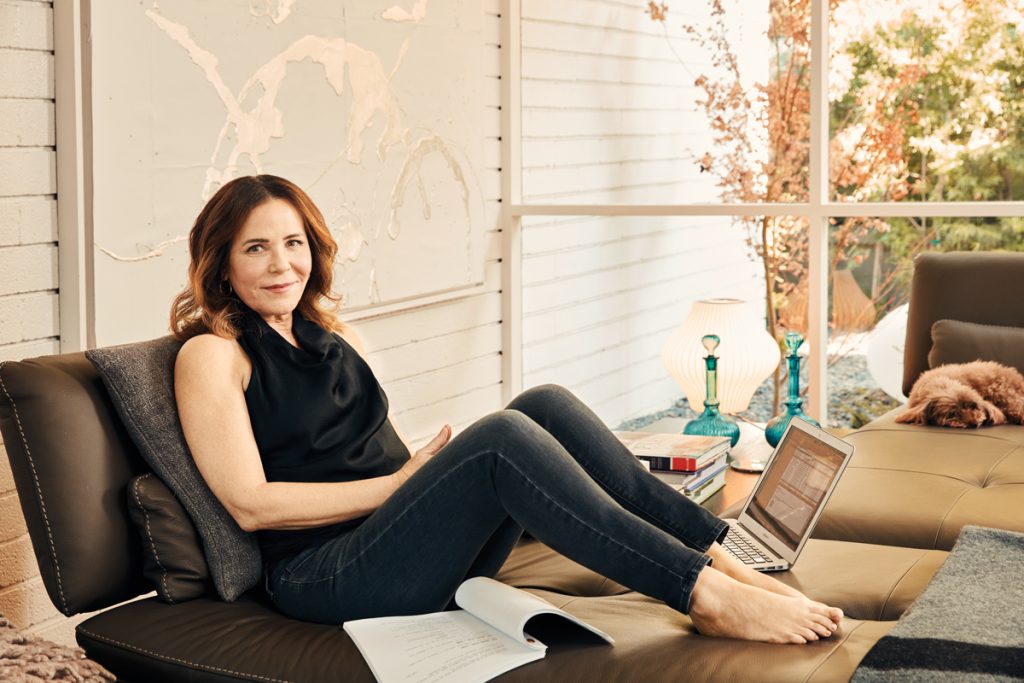Age: 60
Profession: Director and producer
Location: West Los Angeles
You’ve produced over 40 box office and television films since the late 1980s, including The Nightmare Before Christmas, A Walk to Remember, and Batman Returns, and you’re making your directorial debut in the spring. Has Buddhism impacted the way in which you navigate a highly competitive industry?
It has not been a magic bullet, but it has made the rollercoaster ride a little bit less intense. I think the biggest breakthrough for me was when I realized that I don’t have to believe everything my mind tells me—I can meet it with some compassion and some detachment.
In the film business you’re constantly comparing your success to others’ successes. But comparing yourself is an almost instantaneous way to connect with suffering. So when I’m very strong in my practice, which is not always, the teachings are so helpful in navigating my way through my work.
Of course, you still have to make judgments and choices.
If you don’t make choices in things, you’re in trouble. But you can look at the context of where the judgment is coming from. Is it a skillful comparison where you’re making the right choice for the right requirement? Or are you comparing based on ego judgment?
How long have you been practicing?
I’ve been a lifelong seeker, starting when I was 14 or 15 years old in the 1970s. I was a hippie; I read Ram Dass and got into yoga and Transcendental Meditation. I followed that path for years, trying all different types of yoga and meditation. Then I got married, had kids, and also attended a Christian church. I had read about Buddhism, but I always felt that it was too rigorous for me intellectually. And I was intimidated by the practice.
About 12 years ago I was suffering in aspects of my work, my marriage, and raising kids, and I felt like the things I was doing were Band-Aids, making me feel better temporarily. And then I thought, “You know what? I’m going to start really reading.” I took three or four classes at InsightLA. And the simplicity of the five precepts, the fundamentals of vipassana, and the four noble truths and eightfold path made eminent sense to me.
Now you’re a dharma teacher at Against the Stream (ATS) Buddhist Meditation Society in Los Angeles. Why did you decide to become a teacher?
Noah Levine was offering a one-year facilitator training class, and I thought it would be a way for me to practice in a different way on a deeper level. I started teaching mindfulness once a week at Pacific Lodge Youth Services in Woodland Hills, California, a residential treatment center for juvenile offenders. It brought me so much joy as well as balance to my life in the movie business. And I really wanted to continue, so I entered a three-year teacher training program.
Tell me about the film series you host at ATS, “Dharma Goes to the Movies.” When I was first in teacher training I thought, “Gosh, I’m so different from all these other people.” Most of the other teachers worked in public service, for nonprofits, or as therapists, and here I was this movie producer. And I thought, “Well, I’ll use movies.” It was my way of feeling secure while teaching the dharma.
I started showing films to look at the dharma from within the movie. Most great spiritual teachers have taught through metaphors, stories, and mythology; the Buddha was no exception. So I approached it that way. It has its limitations—it’s not a really serious, rigorous dharma talk, and I don’t present it as such. It’s more of a fun thing we do as a sangha, where I’ll introduce the movie and talk about some of the basic main dharma concepts to keep a lookout for, and at the end we have a discussion.
What films really resonated with participants?
An interesting one was Fight Club—we talked about the ego and Mara [the Buddhist devil]. Edward Scissorhands [which Di Novi produced with director Tim Burton] was a good one—a lot comes out concerning unconditional love and compassion. And Crazy, Stupid Love was very lively because people really struggle with questions of attachment and romantic love—whether it’s OK to be so attached to one person, to love them more than other people, and the suffering that comes with that attachment. And how to have romantic love for a partner without unskillful attachment and possessiveness.
Women’s equality and pay equity have been a hot topic in Hollywood over the last year or so. Do you see any parallel challenges in being a woman director and a woman dharma teacher?
I just directed my first movie, Unforgettable, which is coming out in April. I think that partially happened because the studios are trying to be more equitable. A lot has changed, but it’s still not even remotely close to equitable for women or people of color. There’s still a good amount of work to be done, but something is shifting. And from millennials and people in their thirties, I see less inherent sexism than when I started. So I’m hopeful about the future.
There seem to be a lot of famous women dharma teachers, but I think if you actually go sangha by sangha there are probably not so many. I have never felt that I’ve been judged as less than equal as a dharma teacher, though. It’s much more open and equitable than other fields that I’ve been in.
Thank you for subscribing to Tricycle! As a nonprofit, we depend on readers like you to keep Buddhist teachings and practices widely available.
